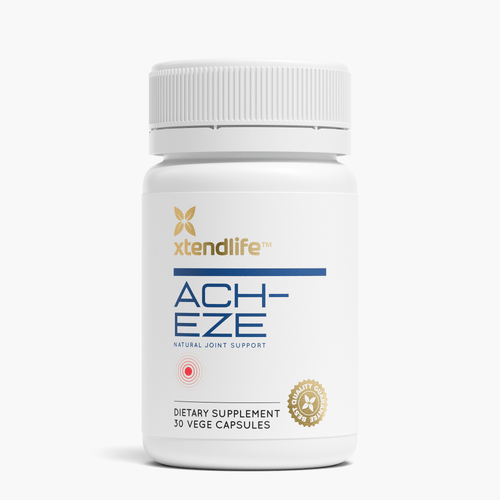Pain is your body’s way of saying something is wrong, and in most cases, it is linked to inflammation which is something that we can control.
Exercise to control pain
Dr. Mark Hamer, an epidemiologist at University College London tells Prevention magazine that inflammation increases as we age in part due to the loss of muscle mass and other physical changes that happen with age. (Ref. 2)
Given that, maintaining muscle mass is a good way to stave off inflammation, making exercise a critical component.
Hamer led a 4,000-person study looking at the long-term role exercise had on inflammation and found that over a 10-year period those who exercised at least 2 and a half hours per week – that’s an average of 20 minutes per day – saw their inflammation markers reduced by at least 12 percent.
While you might see exercise as counter-productive when it comes to controlling pain, it works for a variety of different reasons. Not only does moving help keep joints from stiffening by increasing blood flow, exercise also helps reduce stress which can trigger inflammation.
Eating to reduce inflammation
A healthy diet is also a critical component to keeping inflammation at bay. Eating foods that contain nutrients to calm inflammation can help ease joint pain, as well as boost feelings of well-being naturally. Foods that are rich in omega-3 fatty acids, such as salmon, are especially beneficial.
Limiting processed foods – foods that don’t resemble their natural selves – as well as foods high in sugar and saturated fat can go a long way toward limiting inflammation.
“They cause over activity in the immune system, which can lead to joint pain, fatigue, and damage to the blood vessels,” said Dr. Scott Zashin, a clinical professor at the University of Texas Southwestern Medical Center in Dallas, in an interview with Health magazine. (Ref. 3)
Some foods that limit inflammation include:
- Foods rich in omega-3s: Fish that have high levels of omega-3 fatty acids can help reduce inflammation. Experts recommend eating fish at least twice a week – especially salmon, tuna and sardines – to reap the many benefits of omega-3s.
- Whole grains: While refined foods like white flour, ready-to-eat cereal, white rice and traditional pasta can trigger inflammation, eating whole versions – brown or wild rice, quinoa, whole-grain pasta, oatmeal, etc. – provides essential fiber, which has been shown to reduce levels of C-reactive protein in the blood, an important inflammation marker.
- Leafy greens: The vitamin E found in leafy greens such as kale, spinach, broccoli and collard greens - has been shown in studies to keep cytokines operating properly. They are also rich in other antioxidants that can help keep inflammation and free radicals at bay.
- Nuts: Walnuts, almonds and other nuts are packed with nutrients such as alpha-linoleic acid, omega-3 fatty acids and antioxidants which can help the body fight off inflammation.
- Yogurt: While dairy can trigger inflammation in those who are lactose intolerant, the probiotics in many yogurts can reduce inflammation in the gut, crowding out bad bacteria and replacing them with healthy ones. Give your digestive system a boost with Kiwi-Klenz. It is packed with prebiotics which increases the abundance of good bacteria in your digestive system.
- Cayenne pepper: The capsaicin in cayenne has been linked to both a reduction in pain as well as inflammation. It can be used topically (mix powdered cayenne with olive or coconut oil and apply as needed) or ingested either in raw or powdered form.
- Tomatoes: Tomatoes are not only perfect as the T in a classic BLT sandwich, they are also rich in lycopene which gives them their red color. Lycopene has been shown to help reduce inflammation.
- Beets: The betalains in beets give them their bright red color and have been shown to help reduce inflammation.
Addressing Pain and Inflammation
Localized inflammation contributes to the pain of arthritis, carpal tunnel syndrome and other muscle and joint disorders.
Research has pointed to highly effective natural options to ease inflammation and pain, including curcumin which is found in turmeric. This is a powerful anti-inflammatory that has been reviewed in hundreds of papers for it's beneficial effects.
PEA (palmitoylethanolamide) is naturally produced in the body to fight pain and inflammation, however, people who have been suffering pain for a long time may have insufficient levels of PEA. Research has shown that PEA has anti-inflammatory and pain-relieving properties. Taking it regularly as a supplement may boost your body’s natural response to pain by dampening the pain response in the nervous system.
Undenatured Type-II Collagen is a special and rare type of collagen that you won't find in many supplements. It's different from the collagen that you take for skin and nails which is broken down into short fragments to make it easier to absorb. Undenatured Type-II Collagen on the other hand is not broken down. In fact, it is in the same form as would be found in your body, hence it is often referred to as 'native'.
Undenatured Type II Collagen works on special receptors in the digestive system called Peyer's Patches. By interacting with these receptors, Undenatured Type-II Collagen helps to regulate the body's response to its own type-II collagen, reducing its degradation and supporting healthy joints.
Managing inflammation in a healthy and natural way is made easy with our potent new supplement Ach-Eze. With highly bioavailable curcumin, PEA and undenatured Type-II Collagen, working together to support the health, mobility and function of your joints - allowing you to keep moving and remain active.
Ach-Eze - Joint Support
Award-winning ingredients clinically tested for natural pain and joint support.
Shop now
References:
- www.womentowomen.com/inflammation/arthritis-and-joint-pain-inflammation-could-be-at-work/
- www.prevention.com/health/health-concerns/moderate-exercise-reduces-inflammation-study
- www.health.com/health/gallery/0,,20705881,00.html
- www.arthritis.org/living-with-arthritis/treatments/natural/supplements-herbs/guide/fish-oil.php


 Supplements
Supplements Superfoods
Superfoods Bundles
Bundles



















